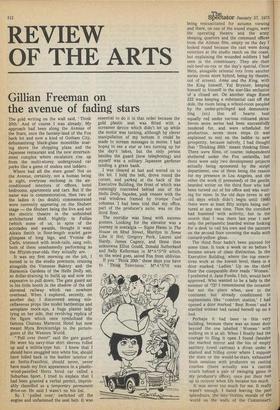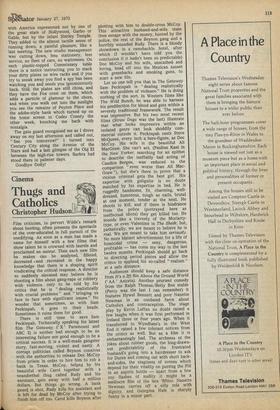REVIEW OF THE ARTS
Gillian Freeman on the avenue of fading stars
The gold writing on the wall said, Think 20th.' And of course I was already. My approach had been along the Avenue of the Stars, once the fantasy-land of the Fox back lot and now a kind of Gotham City, dehumanising black-glass monoliths soaring above the shopping plaza and the Japanese restaurant and the new entertainment complex where escalators rise up from the multi-storey underground car parks like a game of snakes and ladders.
Where had all the stars gone? Not on the Avenue, certainly, not a human being in sight, everyone enclosed in the air conditioned interiors of offices, hotel bedrooms, apartments and cars. But if the name was in commemoration, then two of the ladies it (no doubt) commemorated were currently appearing on the Shubert stage — the Shubert being the live and not the electric theatre in the unfinished architectural shell. Nightly, in FoliiRs (which some of us. in spite of the accolades and awarris, thought it was) Alexis Smith in floor-length scarlet gave glimpses of long legs, and Yvonne de Carlo, trimmed with mink-tails, sang solo, both of them unashamedly performing as the fiftyish-year-olds they actually are.
It was my first morning on the job, I turned in to the studio precincts, cruising alongside the Viennese Bakery and the Harmonia Gardens of the Hello Dolly set, so dollar-draining to build, up and now too expensive to pull down. The gate guard sat in his little booth in the shadow of the old elevated railway which ran nowhere overhead. When I explored, secretly, on another day, I discovered among miscellaneous props like model battleships and aeroplane mock-ups, a huge plaster lady lying on her side, that revolving replica of the figure which once symbolised the famous Chateau Marmont Hotel but now meant Myra Breckinridge to the picturegoers of the Western World.
"Pull over there!" said the gate guard, He wore his navy-blue shirt sleeves rolled up and a militia-type hat. I knew that I should have snuggled into white fox, should have lolled back in the leather interior of an Isotta-Fraschini, should never, never have made my first appearance in a plasticwood-panelled Hertz hired car called a Suburban Sport. I tried to explain that I had been granted a verbal permit, improbably classified as a temporary permanent drive-on. He said I wasn't on his list.
So I ' pulled over,' switched off the engine and unfastened the seat belt. It was essential to do it in that order because the gold plastic seat was fitted with a screamer device which didn't let up while the motor was turning, although by clever manipulation of my bottom it could be made to scream messages in morse. I had hoped to see a star or two turning up for the day's takes, but the only person besides the guard (now telephoning) and myself was a solitary Japanese gardener tending a grass bank.
I was cleared at last and waved on to the lot. I held the belt, drove round the corner, and parked at the back of the Executive Building, the front of which was cunningly concealed behind one of the Hello Dolly façades, pink veneer with the real windows framed by trompe l'oeil columns. I had been told that my office, part of the producer's suite, was on the third floor.
The corridor was lined with success posters. Looking for the elevator was a journey in nostalgia — Signe Hasso in The House on 92nd Street, Marilyn in Some Like it Hot; Gregory Peck, Laurel and Hardy, James Cagney, and those then unknowns Elliot Gould, Donald Sutherland and Sally Kellerman in M*A*S*H which, so the word goes, saved Fox from oblivion.
If you 'Think 20th ' these days you have to 'Think Television.' M*A*S*H was being rescuscitated for autumn viewing and there, on one of the sound stages, were the operating theatre and the army sleeping quarters and the command offices from the Altman film, empty on the day I looked round because the cast were doing exteriors at the studio ranch on the coast, but explaining the wounded soldiers I had seen in the commissary. They ate their salt-beef-on-rye or the day's special, Chow Mein, alongside oriental tots from another series (even more hybrid, being by theatre, out of screen). Anna and the King, with the King himself, Yul Brynner, keeping himself to himself in the star-like seclusion of a closed set. On another stage Room 222 was keeping a substantial cast off the dole, the room being a school-room peopled by the under-privileged and demonstrating (sic) that all hearts beat equally red under various coloured skins. Seven more series had been successfully tendered for, and were scheduled for production, seven more steps (it was explained to me) on the ladder to new prosperity, because naively, I had thought that Thinking 20th' meant thinking films. There were films, of course; independents sheltered under the Fox umbrella, but there were only two development projects actually being sponsored by the script department, one of them being the reason for my presence in Los Angeles, and the other the work (I presumed) of the gentle, bearded writer on the third floor who had been turned out of his office and was waiting for mine. In the old days (even in my old days which didn't begin until 1966) there were at least fifty scripts being nurtured at any one time. Then the corridors had hummed with activity, but in the month that I was there last year I saw only the peripatetic bearded writer looking for a desk to call his own and the painters on the second floor covering the walls with custard-yellow gloss.
The third floor hadn't been painted for some time. It took a week or so before I became aware of class distinction. In the Executive Building, where the top executives work at the lowest level, there is a door marked Ladies.' Up on the third floor the comparable door reads 'Women.' I preferred it. Jane Fonda, I felt, would have approved. Who wanted to be a lady in the summer of '72? I remembered the occasion but not the place when, new to the continent but already conditioned to euphemisms like 'comfort station,' I had opened a door marked 'Rest Room' and a startled woman had raised herself up on a bed.
Perhaps it had been in this very building, because there was an inner door beyond the one labelled ' Women ' with nothing on it at all. When I finally had the courage to fling it open I found (besides the marked mirror and the bin of empty ,sanitary towel cartons) a divan under a stained and frilled cover where I suppose the stars or the would-be-stars, exhausted from sessions with producers on casting couches (there actually was a casting couch behind a pair of swinging gates in my producer's office), once put their feet up to recover when life became too much.
It was never too much for me. It really wasn't enough. I hated leaving the past splendours, the late-'thirties murals of the world on the walls of the Commissary, with America represented not by one of the great stars of Hollywood, Garbo or Gable, but by the infant Shirley Temple. They added to the almost tactile sense of running down, a painful pleasure, like a last meeting. The new studio management was cutting down, less stationery, less service, no fleet of cars, no waitresses. On each plastic-topped Commissary table there is a notice instructing you to stack your dirty plates on wire racks and if you try to sneak away you find a spy has been watching you and sends you ignominiously back. Still, the plates are still china, and they have the Fox crest on them, which adds a particle of glamour to the chore, and when you walk out into the sunlight you see the remains of Peyton Place and the adobe-style bank which turned up on the home screen •in Cades County the other week, knocking me back with nostalgia.
The gate guard recognised me as I drove away on my last afternoon and called out, "See you tomorrow!" I turned into Century City along the Avenue of the Stars and had a last glimpse of the Old El between the high-rise towers. Barbra had stood there in palmier days.
Goodbye Dolly!



































 Previous page
Previous page